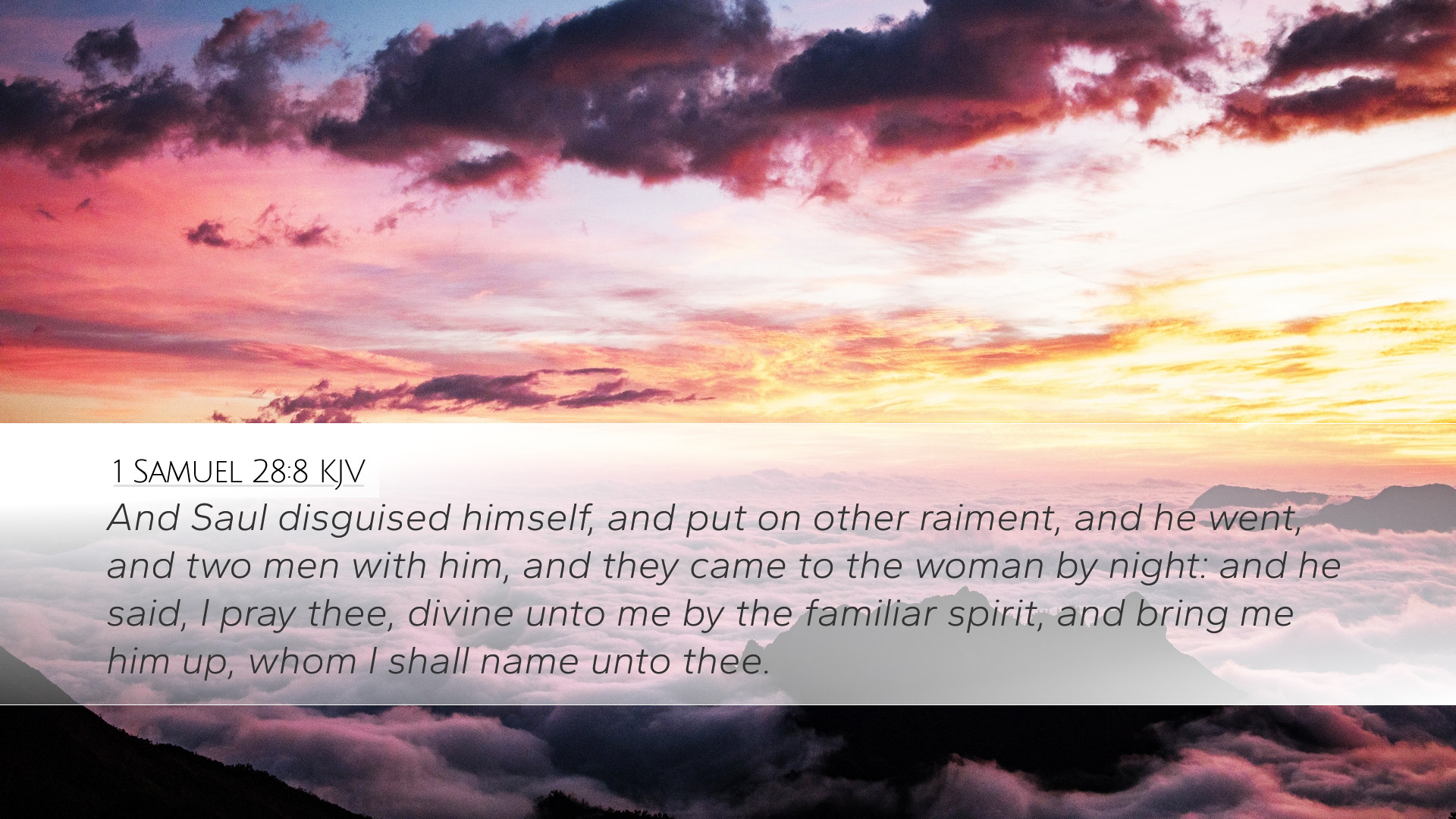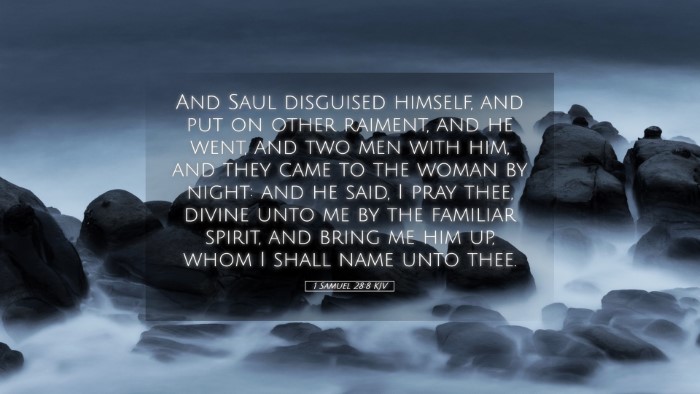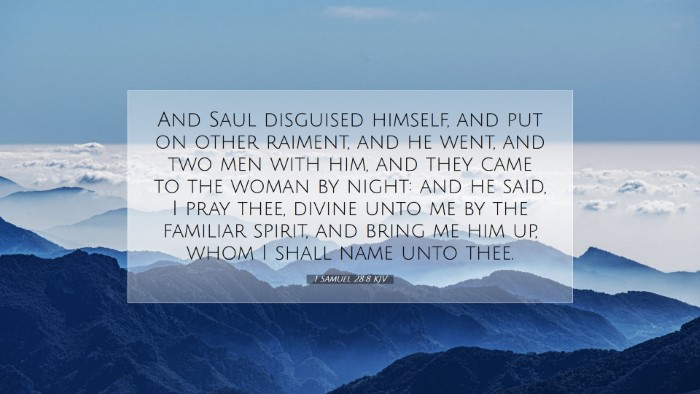Commentary on 1 Samuel 28:8
The verse in question, 1 Samuel 28:8, marks a significant moment in the narrative of King Saul. This passage occurs in a tumultuous period of Saul's reign, characterized by his decline due to disobedience to God and his increasing isolation. Saul's desperation leads him to seek out a medium—a practice explicitly forbidden by Mosaic Law.
Contextual Background
To fully grasp the implications of Saul's actions in this verse, it is essential to consider the historical and contextual backdrop. At this time, the Philistines were mounting a formidable threat against Israel, and Saul, feeling abandoned by God and facing imminent danger, was in a state of panic (1 Samuel 28:5).
Analysis of the Verse
1 Samuel 28:8 states:
"So Saul disguised himself and put on other garments, and he went, and two men with him. And they came to the woman by night; and he said, 'Consult a spirit for me, and bring up for me the one I shall name to you.'"
Saul's Disguise
Matthew Henry notes that Saul’s disguise signifies a level of deceit and desperation. By covering his identity, Saul acknowledges the illegality and impropriety of his actions, suggesting that he is fully aware of his sin yet driven by the fear of his situation. This act of deceit is not only a reflection of his personal moral decline but also underscores the tragic irony of a king seeking illicit counsel instead of directing his fears toward God.
The Decision to Consult a Medium
The act of consulting a medium further illustrates Saul's desperation. Albert Barnes highlights that God's silence had driven Saul to seek guidance from forbidden sources. This act was not merely a moment of poor judgment; it reflects the culmination of Saul's chronic disobedience and lack of faith. His request to 'bring up' someone demonstrates an attempt to bypass God’s authority and dominion over life and death—an act that radically challenges the principle of divine sovereignty.
Spiritual Implications
Adam Clarke discusses the broader spiritual implications of Saul's actions. Seeking the dead, which stands in stark contrast to biblical teachings, illustrates Saul's complete disregard for God’s laws. Clarke argues that this signifies the depth of Saul's alienation from God; he is willing to embrace the occult rather than repent and seek restoration. This act serves as a cautionary tale about the consequences of turning away from divine guidance.
Theological Reflections
God’s Silence and Human Desperation
The silence of God in Saul's life is profoundly significant. As theological reflections reveal, Saul's gradual distancing from God has led to a spiritual void, making him susceptible to desperation. In times of crisis, this passage raises essential questions about believers’ reliance on God versus seeking answers through worldly means. The darkness surrounding Saul’s actions serves as a metaphor for the spiritual blindness that often accompanies disobedience.
Identity and Repentance
The need for Saul's disguise symbolizes the duality of his identity as both the king of Israel and a man estranged from God. The commentaries emphasize that true leadership should be undergirded by righteousness and integrity. Saul's failure to repent and redirect his focus towards God leads him to rely on subterfuge, a reminder of the importance of authenticity in the Christian walk.
The Role of Fear
Fear is a compelling narrative device in this account. Saul’s fear of the Philistines and the arising consequences of his actions lead him away from God and into deeper moral confusion. Henry points out that fear can act as a powerful motivator, but when it drives one to forsake divine guidance, the results can be disastrous. This aspect of the passage serves as an exhortation for contemporary believers to confront their fears with faith rather than resorting to worldly solutions.
Practical Applications
- Seek God First: Believers are encouraged to develop a habit of seeking God in prayer before resorting to other means for guidance or comfort.
- Avoid Deceptive Practices: This account serves as a reminder of the importance of integrity in spiritual leadership. The temptation to cut corners through deceit should be avoided at all costs.
- Courage in Adversity: When faced with fear, individuals are called to stand firm in their faith, relying on God's promises rather than succumbing to panic.
- Reflect on Disobedience: Individual reflection on areas of disobedience can lead to a deeper understanding of how such choices influence one’s relationship with God.
Conclusion
The events surrounding 1 Samuel 28:8 encapsulate the tragic trajectory of Saul’s life, illustrating the gravity of turning away from God's guidance. Public domain commentaries enrich the understanding of this verse, providing vital insights into the interplay of fear, identity, and the dire consequences of disobedience. For pastors, theologians, and scholars, this passage serves as a potent reminder of the need for unwavering commitment to God amidst trials and tribulations.


